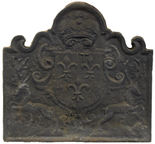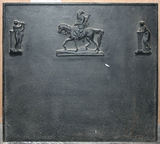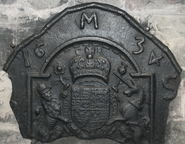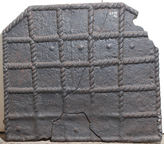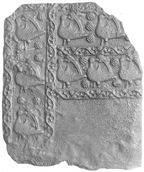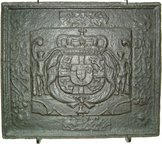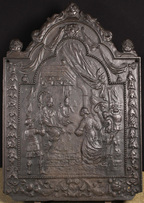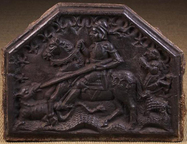-
932
Description: Carved wooden fireback pattern. Canted arched rectangular shape with cavetto-moulded astragal edging; coronet in arch; oval shield with a crowned lion lion rampant, supported two griffons reguardant, the whole within a cartouche, the bottom of which terminates in two swirls between which is a human mask.
Notes: Theodore Agrippa d'Aubigné
Arms: Theodore Agrippa d'Aubigné
- Decoration tags:
- rectangular with canted top corners and round arch (shape)
- astragal with cavetto (edging)
- whole carved pattern
- planklines
- armorial
Manufactured: in the early-17th century in France.
Current location: not known.
Citation: Carpentier, H., 1912, Plaques de Cheminées (Paris, published by the author).
- Attached to series:
- Patterns
- Personal armorial firebacks
-
918
Description: Rectangular with complex quasi-arched rectangular top; ovolo moulded edging; shield with Royal arms of France in a swirled cartouche, initials IT top centre; above, an English crown; below to right and left, a prancing stag.
Notes: The combination of the English crown and French arms is common and may relate to the marriage of Charles I and Princess Henrietta Maria of France in 1625; although the framing of the pattern is very similar to others of the same basic design, the style suggests a different pattern maker. A variant of an otherwise identical fireback, with the addition of the date and initials. Bonhams sale, Chester, 25 July 2013, lot 257.
Copies of this fireback are known.
Inscription: IT / 16 [?]1
Arms: France modern
Manufactured: in the early- to mid-17th century possibly in the Weald area of England.
Current location: not known.
- Attached to series:
- Ornate border series
- Miscellaneous royal firebacks
- Anglo-French armorial firebacks
-
180
Description: Rectangular: fillet edging; top left, standing classically dressed female figure playing a lyre, with short column behind; top right, classically dressed female figure leaning on a short column; top centre, hatted figure of a bearded man with bagpipes on his back, riding a horse.
Notes: An unusual group of stamps, possibly derived from brass chimney ornaments; the middle figure seems to have little in common with the other two, and the horse’s tail may include part of another figure. Formerly part of the Ade Collection (from Grove Hill, Hellingly, Sussex).
- Decoration tags:
- rectangular (shape)
- fillet (edging)
- carved stamps
- animals
- humans
Manufactured: in the late-19th to early-20th century in England.
Current location: Hastings Museum and Art Gallery, John's Place, Bohemia Road, Hastings, East Sussex, England.
Museum number: HASMG: 1952.51.66 (part of the Hastings Museum museum group)
- Attached to series:
- Ornament stamp firebacks
- Metalware stamp firebacks
-
1076
Description: Fragment; arched rectangular fireback with embattled, cavetto-moulded edging; English Stuart royal shield, Garter, crown and supporters, stemmed rose and stemmed thistle, respectively, to left and right of crown; initials CR above crown; all within a plain border, with short lengths of twisted rope edging containing, at the top, the initial M between a split date; initials (only S surviving) below date.
Notes: A Carolean composite fireback. The armorial fireback includes stylistic elements - the form of the unicorn and of the harp - identical to those on two series of firebacks dated 1618 and 1619, indicating the work of the same pattern-maker; its width is 490mm.
Inscription: M / 1634 / [?] S / C R
Arms: English Stuart royal (Charles I)
- Decoration tags:
- rounded arched (shape)
- rope (edging)
- carved pattern panels
- composite
- individual letters
- individual numbers
- heraldic
- armorial
- text
Manufactured: in 1634 possibly in the Forest of Dean area of England.
Current location: Black and White House Museum, The Old House, High Town, Hereford, Herefordshire, England.
-
385
Description: Rectangular with two-stepped top; plain plate; date across lower step; rope saltire in upper step; initials split below outer shoulders.
Notes: The distinctive hand-formed characters on this and some other stepped firebacks imply a common source. Although the talbot crest, by which other firebacks in the series are identified, is absent on this casting, the shape and the style of the characters places it incontrovertably in the same group. Formerly part of the J. H. Every collection.
Inscription: 1615 / R T
- Decoration tags:
- stepped (shape)
- none (edging)
- simple stamps
- individual letters
- individual numbers
- text
- objects
Manufactured: in 1615 in the Weald area of England.
Current location: Anne of Cleves House, Southover High Street, Lewes, East Sussex, England.
Museum number: 1944.24.050 (part of the Sussex Archaeological Society museum group)
Citation: Anon., 30 Dec 1911, 'Sussex Backs and their Story', The Ironmonger.
Citation: Hughes, G. B., 21 Apr 1955, 'Old English Firebacks', Country Life, 117, pp. 1056-60.
Citation: Hughes, G. B., May 1940, 'Old English Firebacks', Apollo, 31, 185, pp. 117-120.
- Attached to series:
- Stepped firebacks
- Talbot crest series
-
461
Description: Canted rectangle; twisted rope edging; irregularly spaced, 5 x 5 rope grid; damage to top right corner.
Notes: A 5 x 3 variant is also known.
- Decoration tags:
- rectangular with canted top corners (shape)
- rope (edging)
- simple stamps
- objects
Manufactured: in the mid- to late-16th century in the Weald area of England.
Current location: Anne of Cleves House, Southover High Street, Lewes, East Sussex, England.
Museum number: 1944.24.046 (part of the Sussex Archaeological Society museum group)
- Attached to series:
- Rope design firebacks
-
854
Description: Sub-rectangular fragment; undulating vine tendril strip repeated twice vertically from left edge with a bird stamp (probably a swan, a Lancastrian badge) repeated three times between, interspersed with a grape cluster stamp repeated seven times; vine tendril stamp repeated twice horizontally at right angles to rightmost vertical strip, three bird stamps between strips and two above, interspersed with seven grape cluster stamps.
Notes: This fragment incorporates common elements from a large series of firebacks.
- Decoration tags:
- rectangular (shape)
- trailing vine (edging)
- carved stamps
- animals
- plants
Manufactured: in the mid- to late-16th century possibly at Pounsley Furnace, Framfield in the Weald area of England.
Current location: Anne of Cleves House, Southover High Street, Lewes, East Sussex, England.
Museum number: LH000.924 (part of the Sussex Archaeological Society museum group)
- Attached to series:
- Pounsley series
- Vine strip series
- Swan series
- Furniture stamp firebacks
-
764
Description: Stove-plate; rectangular; flanged edging; central rectangular panel bearing the shield of the kingdom of Denmark and Norway with male supporters, encircled by the chain of the Order of the Elephant; one each side of the central panel, repeated floriate stamps and flower heads.
Notes: A similar plate is illustrated by Nygard-Nilssen vol. 1, p.255. The poor detail suggests that this is a copy.
Arms: Kingdom of Denmark and Norway
- Decoration tags:
- rectangular (shape)
- flanged (edging)
- carved stamps
- carved pattern panels
- armorial
Manufactured: in the early- to mid-18th century .
Current location: Victoria & Albert Museum, Cromwell Road, Kensington & Chelsea, Greater London, England.
Museum number: M.12-2002 (part of the Victoria & Albert Museum museum group)
Citation: Nygard-Nilssen, A., 1944, Norsk Jernskulptur (Oslo, Cappelens Forlag).
- Attached to series:
- Foreign armorial firebacks
-
1289
Description: Arched rectangular central panel with additional arch above; bead edging; pictorial scene of Solomon, rising seated on a scallop-backed, canopied throne, greeting the Queen of Sheba, with other figures in attendance; identical shaped border with cavetto-moulded edging; a vase on top with descending swags of drapery; at the sides, festoons of flowers suspended from ribbon bows; at the bottom, a central cartouche between fruit bunches; on top, a bunch of three flowers with an ascending serpent on each side, and a bunch of flowers on each shoulder of the plate.
Notes: Several contemporary paintings are of similar scenes; this design may have been derived from a Dutch engraving of a drawing by an anonymous French artist after Maarten van Heemskerck. The same central panel can be seen on no. 1326. Wilkinsons auction, Doncaster, 25 Mar 2024, lot 606 (£200).
Manufactured: in the mid- to late-17th century in the Siegerland area of Germany.
Current location: not known.
-
1146
Description: Canted rectangular shape; astragal edging with repeated fleurs-de-lys inside top and side edges; figure of St George impaling a dragon to the left with a lance over an undulating ground, with a kneeling figure above a sheep to the right.
Notes: The mould for this unusual fireback may have been formed using a redundant carved, medieval wooden panel, perhaps from a church. Wilkinson's Auctioneers, Doncaster, 24 June 2018, lot 132.
- Decoration tags:
- rectangular with canted top corners (shape)
- astragal (edging)
- whole carved pattern
- pictorial
- mythological
- animals
- humans
Manufactured: in the 16th century in England.
Current location: not known.
- Attached to series:
- Miscellaneous pattern firebacks
 carpentier p229 690x870.png)
